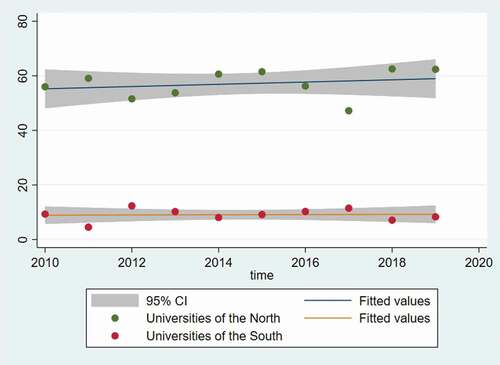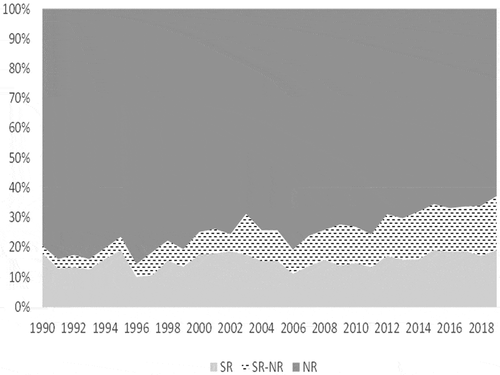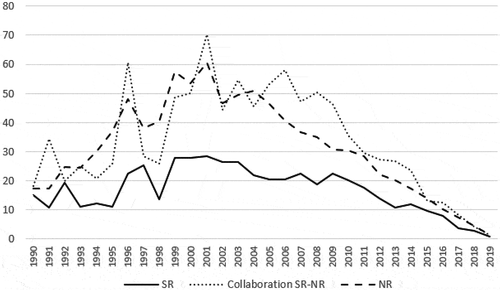ABSTRACT
We present evidence of how researchers from developing countries are represented in three areas of research: conference presentations, articles in journals, and citations. We find that the bulk of research on development and development policies in the South is conducted by researchers from the North. Southern universities represents 9% of conference presenters, while 57% of conference presenters are from Northern universities. There has been no evidence of improvements over time. Fewer than one in six of the articles published in top 20 development journals from 1990 to 2019 were by Southern researchers, while close to three-quarters were by Northern researchers. The remaining 11% were collaborations by Southern and Northern researchers. Additionally, there are also fewer citations per article for Southern-authored articles than for Northern-authored articles.
I. Introduction
Research on economic issues in developing countries is almost exclusively led by researchers who live not in these countries but mainly in the US and Europe. There is increasing recognition that intimate knowledge of a country and an ongoing presence there are likely to give a researcher special insights into the framing of research questions, the application of methodologies and the interpretation of results (Nunn Citation2019). The benefits of diversity in the economics profession and the negative implications of underrepresentation of minorities are recently being recognized (see for example Bayer and Rouse Citation2016). A survey of economists from minority groups (Bayer, Hoover, and Washington Citation2020) has also found that outright bias and a hostile climate lead to disparities in representation, constraining the range of questions studied.
Outside the US, little evidence can be found that shows how certain groups or geographical regions are represented in economics. One exception, an analysis of development studies journals by Cummings and Hoebink (Citation2016), finds that the largest percentages of authors are located in the US (22.3%) and the UK (21.1%). Another example is Chelwa’s study (Citation2020) showing that Africa-based researchers are underrepresented in development-oriented journals with a focus on Africa.
This article draws on analyses by the authors on how researchers from developing countries (or Southern researchers) are represented in three areas of research: conference presentations, articles in journals, and citations.
We looked at developing country researchers’ attendance at seven prestigious international development conferences from 2010 to 2019. Conference participation boosts a researcher’s publication record and career in many ways, so skewed representation means skewed regional distribution of research (Das et al. Citation2009; Tijssen Citation2006). Networking at conferences influences the global development research agenda and filters into researchers’ planning and interpretation of their research. Publication is also essential for reporting research from developing countries and engaging in the academic community. So, we then looked into the publication process at different stages. First, we focused on four development journals to investigate manuscript submission, desk rejection, reviewing and acceptance for developing country researchers during the last years. Next, we present evidence about southern researchers’ publications in the top 20 development journals from 1990 to 2019, and finally, examined the citation records of those researchers as compared to other researchers who published on those journals. Our results indicate that developing country researchers are underrepresented in all three areas, with little evidence of improvement beyond the growth of North-South collaborations. We consider what might explain our findings and we propose possible remedies.
II. Representation at development conferences
We assessed the participation of researchers located in Southern institutions at seven conferences from 2010 to 2019: the World Bank Annual Bank Conference on Development Economics (ABCDE), the African Development Bank African Economic Conference (AEC), the Poverty Reduction, Equity and Growth Network (PEGNet) conference, the World Institute for Development Economics Research (UNU-WIDER) conference, the Centre for the Study of African Economies African (CSAE) conference, the Bureau for Research and Economic Analysis of Development (BREAD) conference, and the North Eastern Universities Development Consortium (NEUDC) conference. We found that developing country researchers were underrepresented. shows that the share for Southern universities remained fairly flat throughout this period, with a mean of 9%, as opposed to 57% for Northern universities.
Figure 1. Representation (papers presented) at development conferences, 2010–2019.

Only the AEC is hosted in Africa. At the other six conferences, hosted in developed countries, the role played by researchers from developing country universities is scant and marginal. At the AEC more than half of the delegates are Southern researchers, which provide support for the intuitive notion that the location of the conference influences regional representation.
III. Representation in development journals
We analyse the publication pipeline for four development journals: Economic Development and Cultural Change (EDCC), the Journal of Human Development and Capabilities (JHDC), the Review of Development Economics (RDE) and the Journal of African Economies (JAE).Footnote1 The first two journals are reputed development journals (included in the Top Twenty development journals by Google Scholar), the second one is a typical mid-level development journal, and the third one is a regional journal. None of them has submission fees, with the exception of EDCC, that established, beginning January 1st, 2021, that all manuscripts submitted to the journal must be accompanied by a submission fee ($50). We consider submissions broken down by the institutional affiliation of the lead author. It is interesting to note that submissions from southern researchers represent 39%, 49%, 60% or 63% of all submissions in each journal, suggesting some kind of sorting process of researchers according to the reputation of the journals (). For the EDCC, JHDC and RDE, the available information allows to consider the importance of desk rejection: submissions from southern researchers were much less likely to be reviewed than submissions from researchers based in Northern countries in the three journals. After this first step, southern papers that were reviewed had similar chances of being accepted for publication in EDCC, but clearly less chances of acceptance in JHDC and, especially, in RDE. If we consider the final result of the process, the rate of acceptance over total submissions is more than twice for northern researchers than for southern ones in EDCC and JHDC, and this difference is more than three times in RDE and almost six times in JAE.
Table 1. Submissions, reviews and acceptance in selected journals.
In the case of RDE, we were able to analyse the reasons for desk rejections: not a good fit for the journal, poor quality introduction or abstract, paper too country-specific for an international journal, focus on methodology rather than an economic question, and paper’s contribution unclear. Also for this journal, papers from the South were more likely to be rejected for plagiarism than those from the North.
The regional representation of researchers in the top 20 development journals from 1990 to 2019 is analysed based on a February 2020 Google ranking using the h5-index mean. The Elsevier Scopus bibliographical database allows to find the share of researchers affiliated to institutions in Southern countries that published in these journals over the period.Footnote2 Authorship was classified as: written by Southern researchers (SR), written by Northern researchers (NR), or written collaboratively (SR-NR).
shows that fewer than one in six (16%) of the articles published in these journals were by Southern researchers, while close to three-quarters (73%) were by Northern researchers. The remaining 11% were collaborations by Southern and Northern researchers. Within a subset (61%) of papers with an explicit focus on a Southern country or region,Footnote3 a substantial majority (62%) were by Northern researchers.
Table 2. Share of development journal publications, by topic and researcher region, 1990–2019.
Southern researchers’ participation has not improved over time. shows that their share of papers in the top 20 development journals has remained flat at 15%. Encouragingly, though, South-North collaborations have increased from 2% in 1990 to 18% in 2020.
IV. Citations records
Southern researchers not only publish less; they also cited less. shows an inverse U-shaped time pattern of citation counts (reflecting lower citations for more recent articles, as expected). There are fewer citations for Southern-authored articles than for Northern-authored articles and South-North collaborations. These differences are statistically significant in all years except 1990, 1991, 1992 and 1997.
V. Conclusion
It is not encouraging to find that the bulk of research on the South is conducted by researchers from the North. The underrepresentation of Southern researchers in research on development in the South might plausibly be attributed to deficiencies in research skills, English language proficiency, scientific networks, and access to research funding and travel grants. But it is also likely that the underrepresentation is the result of a culture of exclusivity in the economics profession (Bayer and Rouse Citation2016; Bayer, Hoover, and Washington Citation2020).
Practices and paradigms that exclude Southern researchers from academic dialogues about development in the South inhibit the plurality and richness of such dialogues. They promote an unhealthy and unsustainable dominance of Northern researchers in a field of research where Southern researchers have the advantage of first-hand knowledge. As development policy in Southern countries affects Southern researchers directly and sometimes severely, they have an additional claim to fair representation in debates that affect their own future.
Ideas are needed on how to create a more inclusive environment for researchers working on development in the South. The role of proficiency in English needs more investigation. Our findings suggest that South-North collaborations could be an avenue for change. Uzuner (Citation2008) cites a number of studies (Belcher Citation2007; Casanave Citation1998; Curry and Lillis Citation2004;; Flowerdew Citation2000) showing that expanded scientific networks help young second-language-English scholars to publish.
Disclosure statement
No potential conflict of interest was reported by the author(s).
Additional information
Funding
Notes
1 The authors are grateful to the editors of these journals for providing the data for this analysis.
2 Regional classifications are based on the geographical location of the first declared affiliated institution.
3 Containing the words ‘Latin America’, ‘Asia’, or ‘Africa’ or the name of any countries in those regions in their title or keywords.
References
- Bayer, A., G. A. Hoover, and E. Washington. 2020. “How You Can Work to Increase the Presence and Improve the Experience of Black, Latinx and Native American People in the Economics Profession.” Journal of Economic Perspectives 34 (3): 193–219. doi:10.1257/jep.34.3.193.
- Bayer, A., and C. E. Rouse. 2016. “Diversity in the Economics Profession: A New Attack on an Old Problem.” Journal of Economic Perspectives 30 (4): 221–242. doi:10.1257/jep.30.4.221.
- Belcher, D. 2007. “Seeking Acceptance in an English-only Research World.” Journal of Second Language Writing 16: 1–22. doi:10.1016/j.jslw.2006.12.001.
- Casanave, C. P. 1998. “Transitions: The Balancing Act of Bilingual Academics.” Journal of Second Language Writing 12: 175–203. doi:10.1016/S1060-3743(98)90012-1.
- Chelwa, G. 2020.“Does Economics Have an “Africa Problem”?” Economy and Society 50 (1):78–99. doi:10.1080/03085147.2021.1841933
- Cummings, S., and P. Hoebink. 2016. “Representation of Academics from Developing Countries as Authors and Editorial Board Members in Scientific Journals: Does This Matter to the Field of Development Studies?” European Journal of Development Research 29: 369–383. doi:10.1057/s41287-016-0002-2.
- Curry, J. M., and T. Lillis. 2004. “Multilingual Scholars and the Imperative to Publish in English: Negotiating Interests, Demands and Rewards.” TESOL Quarterly 38 (3): 663–688. doi:10.2307/3588284.
- Das, J., Q. T. Do, K. Shaines, and S. Srinivasan, 2009. “U.S. And Them: The Geography of Academic Research.” Policy Research Working Paper 5152. World Bank Development Research Group Poverty and Inequality Team & Human Development and Public Services Team, December
- Flowerdew, J. 2000. “Discourse Community, Legitimate Peripheral Participation, and the non-native-English-speaking Scholar.” TESOL Quarterly 34 (1): 127–150. doi:10.2307/3588099.
- Nunn, N. 2019. “Innis Lecture: Rethinking Economic Development.” Canadian Journal of Economics 52 (4): 1349–1373. doi:10.1111/caje.12406.
- Tijssen, R. 2006. “Africa’s Contribution to the Worldwide Research Literature: New Analytical Perspectives, Trends, and Performance Indicators.” Scientometrics 71 (2): 303–327. doi:10.1007/s11192-007-1658-3.
- Uzuner, S. 2008. “Multilingual Scholars’ Participation in Core/global Academic Communities: A Literature Review.” Journal of English for Academic Purposes 7: 250–263. doi:10.1016/j.jeap.2008.10.007.


